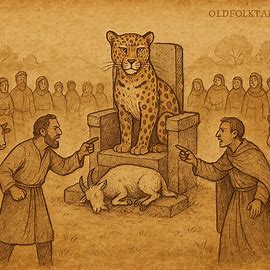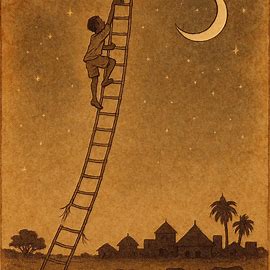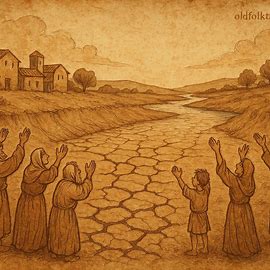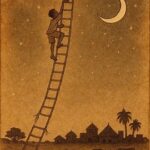Long ago, in the heart of the savanna, a quarrel erupted between two men. They lived in the same village, and though they were neighbors, jealousy often burned between them. One day, a goat disappeared from its pen. Both men accused the other of theft. Their shouts filled the air, drawing the attention of the entire village. Unable to settle the matter, they agreed to bring their case before the Leopard, who was respected as king of the beasts and arbiter of disputes.
The Leopard’s reputation for fairness was well known. When he sat in judgment, animals and people alike trembled before his piercing gaze. His word was law, and neither trickery nor pleading could sway him once he had spoken. The two men, still bickering, led the stolen goat before him as evidence.
The Leopard studied them closely. His golden eyes flashed as he listened to the elder of the two, who insisted with fiery words that the younger was the thief. The younger man, in turn, swore that he was innocent and claimed his elder neighbor had plotted to disgrace him. Both men spoke with passion, but beneath their words the Leopard sensed deceit.
The air grew tense. Villagers and animals alike gathered in a wide circle around the Leopard’s throne of stone. The goat bleated nervously, pulling at the rope that bound it. Everyone leaned in to hear the king’s decision.
The Leopard’s deep voice rumbled across the gathering:
“You come before me not seeking truth, but victory. Each of you is more eager to win than to be honest. I see lies in both your hearts. Therefore, this goat belongs to neither of you.”
Gasps rose from the crowd. The men cried out in protest, but the Leopard lifted his paw for silence. Then, with a swift leap, he pounced upon the goat. His claws struck, his teeth sank deep, and within moments he began to devour the very prize both men had fought over. Blood stained the earth while the villagers watched in stunned silence.
READ THIS: The Girl and the Spirit Drum: A Sudanese Folktale That Teaches Lessons on Greed and Gratitude
When the Leopard finished his meal, he licked his jaws and spoke once more:
“Let this be a lesson. He who twists truth for his own gain will find nothing in the end. Lies feed only the jaws of justice.”
Shame burned in the hearts of the two men. They left the place hungry and dishonored, their dispute forever unresolved. From that day forward, the people of the village remembered the Leopard’s judgment. Elders repeated his warning to their children: “If you lie, even justice will devour what you desire.”
And so the story lived on, carried across the savannas of Sudan, teaching generations that deceit, no matter how clever, leads only to loss.
Moral Lesson
This Sudanese folktale reminds us that truth is the foundation of justice. When lies cloud disputes, no one gains anything, for dishonesty devours the very blessings people seek. The Leopard’s judgment shows that cunning words may win a moment’s attention, but in the end, deception destroys peace and leaves only emptiness.
The tale teaches that fairness and honesty protect both individuals and communities. Without truth, justice becomes impossible, and even rightful claims can be lost. In the world of the Leopard, justice consumes all falsehoods, leaving nothing for those who try to deceive.
Knowledge Check
Q1: Who was chosen to judge the dispute between the two men?
A1: The Leopard, regarded as king of the beasts and a just arbiter.
Q2: What were the two men fighting over in the story?
A2: They fought over a goat, each accusing the other of stealing it.
Q3: What did the Leopard sense in the hearts of both men?
A3: He sensed lies and dishonesty in both of them.
Q4: What did the Leopard do with the goat?
A4: He devoured the goat himself, declaring it belonged to neither man.
Q5: What is the main moral lesson of this Sudanese folktale?
A5: Lies and deceit ultimately destroy what people desire, while only truth leads to justice.
Q6: Which people and region preserve this tale?
A6: The story comes from the Dinka people of Sudan, collected by Frobenius in 1923.
Source: Sudanese folktale, collected among the Dinka people by Frobenius, 1923.






